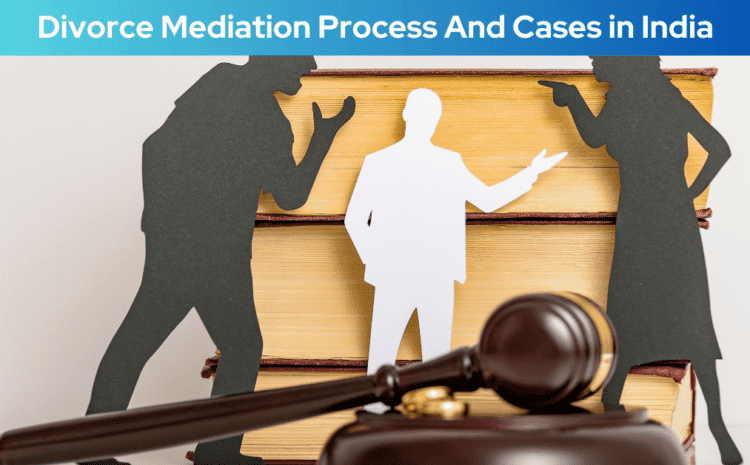
Did you know that statistics from the Bangalore mediation center indicate significant success, with over 20,000 out of 30,000 cases settled through mediation between 2007 and 2014?
The most traditional form of contemporary divorce procedure in India implies the existence of a mediator who is a neutral third party with special training and experience in resolving any conflicts related to divorce. The mediator facilitates talks and helps the couple in applying mediation techniques to resolve their issues.
In recent years, mediation has been one of the most well-known methods of resolving conflicts, especially in divorce cases. During separation, people choose mediation more often as a primary alternative mode of dispute resolution. Mediation is similar to the traditional panchayat that is conducted in households or in communities where a neutral party helps to resolve the conflict between two persons or parties. When compared with courtroom trials, it is more efficient and amicable in terms of settlement, creating a win-win situation for the parties involved.
In this article, let’s discuss the meaning and procedure of mediation with respect to a divorce case. The purpose of this part is to show the advantages mediation has beyond that of other dispute resolution methods in a divorce case.
Understanding Divorce Mediation Process And Cases in India
Mediation in divorce cases entails the involvement of a neutral third party, referred to as a mediator, who guides communication and negotiation between the divorcing spouses. The primary objective is to assist the couple in reaching mutually acceptable resolutions concerning various matters, including child custody, property division, and financial arrangements. This process is favored for its efficacy, particularly when compared to the often lengthy and burdensome court proceedings.
In divorce proceedings, the Court mandates both parties to engage in mediation as a means to encourage the resolution of their differences outside of the courtroom. In India, the ADR aims to mitigate the costs and relieve the burden on courts while at the same time facilitating the mediation process to arrive at a consensus settlement rather than an imposition of the will upon the defendant.
In the case of K Srinivas Rao v D A Deepa, AIR 2013 SUPREME COURT 2176, the Supreme Court Bench issued directions to the courts dealing with the matrimonial matters, which are as follows;
In terms of Section 9 of the Family Courts Act, the Family Courts shall make all efforts to settle marital disputes through mediation. Even if the Counsellors submit a failure report, the Family Courts shall, with the consent of the parties, refer the matter to the mediation center.
In such a case, however, the Family Courts shall set a reasonable time limit for mediation centers to complete the process of mediation because otherwise, the resolution of the disputes by the Family Court may get delayed. In a given case, if there is a good chance of settlement, the Family Court, in its discretion, can always extend the time limit. Quite often, the cause of the misunderstanding in a matrimonial dispute is trivial and can be sorted.
Mediation as a method of alternative dispute resolution has now received legal recognition. We have referred several matrimonial disputes to mediation centers. Our experience shows that about 10 to 15% of marital disputes get settled in this Court through various mediation centers.
At the earliest stage, i.e., when the dispute is taken up by the Family Court or by the Court of first instance for hearing, it must be referred to mediation centers. Matrimonial disputes, particularly those relating to custody of a child, maintenance, etc., are preeminently fit for mediation.
Section 9 of the Family Courts Act enjoins the Family Court to make efforts to settle the matrimonial disputes, and in these efforts, Family Courts are assisted by Counsellors. Even if the Counsellors fail in their efforts, the Family Courts should direct the parties to mediation centers, where trained mediators are appointed to mediate between the parties. Being trained in the skill of mediation, they produce good results.
Advantages of Mediation
Mediation in India provides parties with a range of benefits, including cost-effectiveness, time efficiency, relationship preservation, confidentiality, and flexibility, as demonstrated by various legal precedents.
1. Cost-Effectiveness: Mediation typically costs less than litigation, saving parties significant expenses. In the case of B.S. Krishnamurthy v. B.S. Nagaraj, the Supreme Court of India emphasized the cost-effectiveness of mediation as a dispute resolution method.
2. Time Efficiency: Mediation often leads to quicker resolutions compared to lengthy court proceedings. The case of Damodar S. Prabhu v. Sayed Babalal H. provides an example of how mediation can expedite dispute resolution.
3. Preservation of Relationships: Mediation allows parties to maintain or even improve their relationships by fostering open communication and cooperation. The case of Ramesh Hirachand Kundanmal v. Municipal Corporation of Greater Mumbai highlights the potential for preserving relationships through mediation.
4. Confidentiality: Mediation proceedings are confidential, providing parties with privacy and discretion. The case of D.S. Bist & Ors. v. Dena Bank & Ors. Underscores the importance of confidentiality in mediation.
5. Flexibility: Mediation offers flexibility in crafting solutions tailored to the parties’ unique needs and interests. The case of Salem Advocate Bar Association, Tamil Nadu v. Union of India, emphasizes the flexibility of mediation in addressing diverse disputes.
6. Efficiency in conflict resolution: ‘We recognize mediation as an effective method of alternative dispute resolution in matrimonial matters and that is the reason why we want the parties to explore the possibility of settlement through mediation in matrimonial disputes.’ As observed in Tahmeena Kaleem And Others vs. State Of A.P,
Indian Laws Promoting Mediation
Section 9 of the Family Court Act, 1984 underscores the duty of the Family Court to actively pursue settlement efforts in every suit or proceeding related to family matters. The section mandates that the Family Court must make sincere endeavors to assist and persuade the parties to arrive at a settlement regarding the subject matter of the case. Suppose there is a reasonable possibility of a settlement between the parties at any stage of the proceedings. In that case, the Family Court has the authority to adjourn the proceedings to facilitate such attempts at settlement. This power to adjourn for settlement purposes is supplementary to the Family Court’s other powers and is not meant to replace them.
In relation to marital disputes concerning maintenance, child custody, and divorce, Section 9 mandates the use of mediation as a means of settlement. Parties may be referred to a mediation center with their consent, and counselors may be engaged to aid in dispute resolution. Mediation centers are encouraged to establish time limits for the resolution of conflicts to prevent unnecessary delays.
In the case of K. Srinivas Rao vs. D.A. Deepa, the Supreme Court emphasized the necessity of mediation before seeking a divorce. Additionally, in cases falling under Section 498A of the Indian Penal Code (IPC), the criminal courts are directed to refer complaints to mediation centers before proceeding, except in cases of severe and dangerous cruelty. The establishment of personal litigation clinics within mediation centers has been recommended to resolve marital disputes without court intervention.
Conclusion
Divorce mediation is often hailed as the swiftest and most straightforward method for resolving issues arising from divorce. In today’s fast-paced world, few have the luxury of time to engage in lengthy court battles. Opting for online mediation allows divorcing parties to address their differences through facilitated negotiations efficiently.
Furthermore, courts are actively advocating for the increased utilization of mediation to alleviate the burden on judicial resources. The sheer volume of cases inundating the courts necessitates alternative approaches to dispute resolution, making mediation an attractive option for divorcing couples seeking a timely and amicable resolution.

Advocate Kiran S R – A highly skilled, passionate, dedicated advocate, with vast wealth of knowledge, professionalism, ethical approach and expert skills. One of the sharpest legal mindset brings the best principles of legal practice to the forefront. A qualified Engineer turned Advocate. His passion, dedication and vision to help and assist his clients achieve the best results is his driving force.

